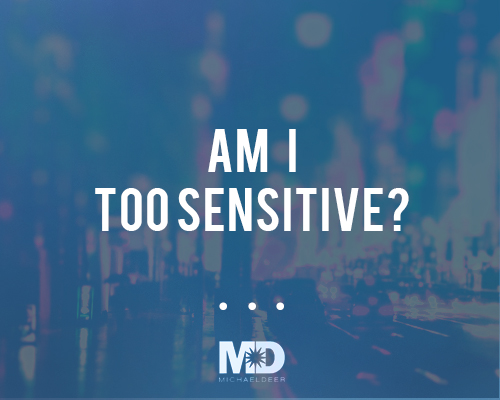Our brain processes unimaginable amounts of data every second. Most of us are unaware of these insignificant sensory inputs. Some people seem to be numb to the world around them. They walk around not even knowing that they are in clear and present danger or that their very existence means peril to so many.
Who’s Insensitive?
One day I had a conversation (well mostly listening actually) to a person blissfully touting that they don’t have any enemies. “I can’t even think about anyone who would doesn’t like me.” Those of us who listened felt the pain in our ears with every word he had spoken. This is because we knew that this person literally had issues. I promise you I’m not being mean. Everyone who knew it, cleared a path, staying out of his way–for their own sanity. Like I said, some people can’t feel the vibes in the air. These people are insensitive or not sensitive enough.
Who’s Too Sensitive?
Others, seem to be cursed with wide eyes, superhuman ears, and a keen awareness of their world that gets them into more trouble than they can handle. They pick up everything. They sense everything. “Why did she look away when she was speaking to me?” “He makes me sick. Did you see how he was turned sideways when we started our conversation facing each other? How arrogant!” Yeah. Just like that. Picking up more clues about our surroundings than we can truly handle. That is to say we are secure in our interpretations of what we are picking up and we can reasonably place our thoughts in right place, without bias.
Being too sensitive has a danger all its own. It cripples us by stifling our potential. I can’t tell you how many people kept themselves from opportunities because they chose to believe what they sensed over the tried and true method of simply addressing an issue head on. A look prevented a healed relationship. A hasty gesture made a business man resentful and unimportant. Because of this, he didn’t share his pitch or ask for the referral.
So, how do we separate being too sensitive from just being observant?
How do we separate being unmoved and secure from being and insensitive sociopath?
It’s true that being aware of your surroundings is important. However, when your observations does harm to yourself or someone else, that cannot be healthy. For example, when you notice that someone is always saying your name wrong. That is an observation. If you were to stop talking to this person solely on the basis of them saying your name wrong (without at least finding out why they’ve been fouling it up) then there is a hyper-sensitivity issue there. Your ability to observe has begun to work against you.
On the other hand, if you don’t even notice that same person is saying your name wrong, that might seem like the solution to hyper-sensitivity, right? Well, if the reason you don’t hear them messing up your is because you don’t even recognize them nor care about them; whether they are happy or sad, secure or in danger, then that’s not good either. Being immune to hyper-sensitivities is good. However, not at the expense of caring about how you affect others.
The bottom line is that:
- If you are aware of your world you are OBSERVANT
- If your observations bring you to reactions or thoughts that harm yourself or others, you are being TOO SENSITIVE
Try these tips to help release those annoying emotional spasms:
1. Step back and look at the bigger picture
I don’t want to say the words self absorbed, but sometimes when we take a person’s actions too personally, it’s because we are thinking about ourselves a bit more than we ought to. Remember life is complex and dynamic. That’s why coaches even have jobs and clients. There are a lot of moving parts. People places and things. Sometimes the behaviors you think are focused on you have little to do with just you. Set back and see what they might be dealing with in their crazy world
2. Give the benefit of the doubt
This is a tactic that is used in professional settings all the time. Think about the last time you called your phone company and said that the payment was sent in already. They don’t say, “well, you’re lying because you lied to us before.” For the sake of their public image (and rating with the Better Business Bureau) they treat you with respect and courtesy. Do the same to those who offend you. Give the same grace and you will be surprised at who was watching your refreshing responses to outright offense and disrespect.
3. Replace “What If’s” with “What Is”
Sensitivities breed isolation. Isolation breeds creative substitutions for reality. One of the most dangerous elements of hyper-sensitivities is believing those scandalous “What if’s.” “What if I try to confront her about the issue in a friendly way and she just flat out disrespects me?” The danger in believing the “what if’s” is that THEY HADN’T HAPPENED YET! You trade in the real possibility for a made up version of what you thought would happen. Never sacrifice a real possibility for the one-sided (your opinion) fantasy of what could happen if you were to confront, address an offense to make progress.

